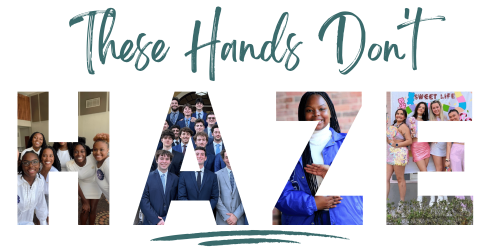
If you think you or someone you know is being hazed, REPORT IT. We investigate all complaints. While often they turn out to be nothing, sometimes they are serious.
Ways to Report:
- You can complete a confidential, detailed Incident Report.
- You can call our Staff at 504-247-1542.
- You can use the anonymous texting line at 504-420-3111.
- You can email our Staff.
We receive calls about possible hazing from students (both fraternity/sorority members and non-members), faculty and staff members, parents, and even students' friends at other universities. Regardless, we never reveal the source of our information – even if a fraternity or sorority is eventually sanctioned. Those reporting a concern should not fear that they or a student they know will suffer any consequences.
Information for the Tulane Community
Often people haze or tolerate hazing because they do not know if what they are participating in constitutes hazing. If you are unsure, ask yourself these questions:
- Does the activity involve mental distress such as humiliation or intimidation?
- Does it involve physical abuse (e.g., sleep deprivation)?
- Is there a significant risk of injury or a question of safety?
- Would you have any reservations about describing the activity to your parents or a university official?
- Is alcohol involved?
- Would you be worried if the activity were shown on the evening news?
If the answer to any of the above questions is "Yes," the activity is probably hazing.
Additionally, Louisiana law requires that every student organization, as defined in the Max Gruver Act, provide at least one hour of annual hazing prevention education to all members and prospective members. Learn more about completing this training and providing certification on the Hazing Prevention Education website.
The Code of Student Conduct is intended to provide all students with the ability to participate in the student conduct process and to seek assistance from the University as needed. In order to encourage students to disclose all relevant information, the University reserves the discretion to refrain from taking disciplinary action against any individual (including a witness or a third party) who shares information in the interest of any individual’s health and safety or in the interest of the Core Values set forth in this Code. This includes, but is not limited to, amnesty for the consumption of alcohol or other drugs at or near the time of any incident. The University may require an educational conference where support, resources, and educational counseling options may be discussed and potentially required with a learning action plan for an individual who has engaged in the illegal or prohibited use of alcohol or drugs. Amnesty may not be given if individuals or groups engage in deceptive behavior, have a significant delay in response or in any way endanger the safety of another. The Dean of Students, or designee, has the final say as to whether amnesty should apply.
